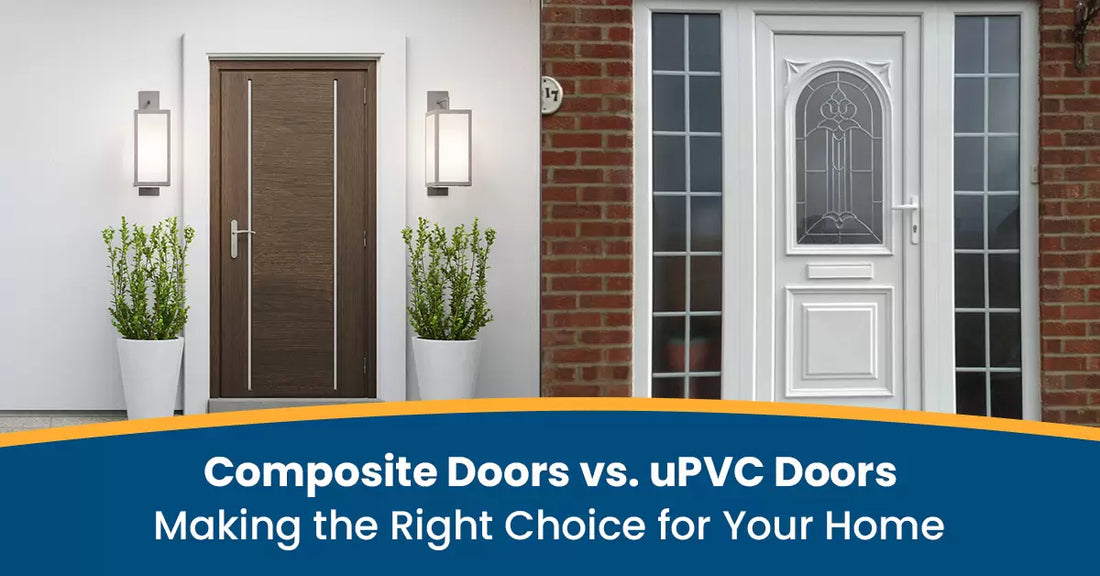When it comes to choosing the right exterior door for your home, two of the most popular options are composite doors and upvc doors. Both are widely used throughout the UK due to their energy efficiency, low maintenance requirements, and modern aesthetics. However, there are significant differences between the two in terms of construction, durability, security, and cost.
This guide compares composite vs upvc doors across a range of factors to help you make an informed decision based on your needs and budget.
What is a Composite Door?
A composite door is made from a blend of materials, typically including wood, insulating foam, uPVC, and a glass-reinforced plastic (GRP) skin. These materials are layered together under high pressure to create a door that is stronger, more weather-resistant, and more thermally efficient than doors made from a single material.
Composite doors are designed to look like traditional wooden doors, but with much better performance in terms of security and insulation.
Key advantages of composite doors:
- Excellent thermal insulation
- High security with multi-point locking systems
- Long lifespan (typically 30+ years)
- Woodgrain finish available in many colours
- Strong resistance to weathering and fading
What is a UPVC Door?
UPVC (unplasticised polyvinyl chloride) doors are made from a single material—rigid plastic—that is known for its resistance to moisture, low maintenance, and affordability. These doors typically include a steel-reinforced frame for additional strength.
UPVC doors are widely used in both front and back entrances, particularly in budget-conscious projects or rental properties.
Key advantages of UPVC doors:
- Affordable and budget-friendly
- Lightweight and easy to install
- Resistant to rust, rot, and peeling
- Low maintenance with occasional cleaning
- Available in a range of simple styles and colours
Comparison Table: Composite vs UPVC Doors
| Feature | Composite Doors | UPVC Doors |
|---|---|---|
| Material | Wood, foam, uPVC, GRP | Unplasticised PVC (plastic) |
| Strength | Very strong and rigid | Moderate with steel reinforcement |
| Insulation | Excellent | Good |
| Security | High security (multi-point locks) | Basic to moderate |
| Lifespan | 30+ years | 15–20 years |
| Maintenance | Low | Very low |
| Style Options | Wide variety, wood-effect | More limited in design |
| Colour Retention | Long-lasting finish | Can fade over time |
| Price | Higher initial cost | More affordable |
Energy Efficiency: Which Door Retains Heat Better?
In the debate of upvc vs composite doors, insulation is a key factor. Composite doors offer superior thermal performance due to their solid core and multiple insulating layers. They effectively reduce heat loss, which can lead to lower energy bills and a more comfortable living space year-round.
UPVC doors also provide reasonable insulation, but they generally have thinner profiles and less effective seals compared to composite doors.
Tip:
Look for doors with a high energy rating (A-rated or above) for optimal thermal efficiency.
Security and Safety
Composite doors, due to their dense structure and robust locking systems, provide excellent protection against forced entry. Most are equipped with multi-point locking systems as standard.
UPVC doors also offer decent security, especially when fitted with anti-snap cylinders and modern locks. However, the door frame and panel can be more vulnerable to pressure or impact.
Did you know?
Most insurance companies offer better premiums or discounts on policies when your home features certified high-security composite doors.
Design and Aesthetics
Composite doors are available in a wide variety of styles, colours, and finishes. Many options mimic the texture and look of real wood without the maintenance.
UPVC doors tend to have simpler designs and limited customisation. While white is the most common colour, other shades like grey, black, and oak are also available.
Tip:
If kerb appeal is important to you or you're looking to increase property value, composite doors typically have greater visual impact.
Lifespan and Durability
Composite doors are incredibly durable and can last over 30 years with minimal maintenance.
UPVC doors generally last between 15 and 20 years and are more susceptible to warping or fading under extreme conditions.
Maintenance tip:
Clean composite doors with warm water and a soft cloth. Avoid abrasive materials and pressure washers.
Cost Comparison
| Door Type | Average Price Range (Installed) |
|---|---|
| Composite Door | £900 – £1,800 |
| UPVC Door | £400 – £900 |
Environmental Impact
UPVC is non-biodegradable and more difficult to recycle, though modern manufacturing efforts are improving its sustainability. Composite doors have a longer lifespan, which may offset their more complex construction when considering lifetime carbon footprint.
Tip:
Ask your installer about eco-friendly or recycled options when purchasing either door type.
When to Choose a Composite Door
- You want a premium appearance
- Security is a top concern
- You need excellent insulation
- You're investing long-term in your home
- You want to boost kerb appeal and resale value
When to Choose a UPVC Door
- You’re on a limited budget
- You need a secondary door (back or side)
- You prefer a low-maintenance solution
- You want something lightweight and easy to install
Final Thoughts: Composite vs UPVC Doors
The decision between composite and UPVC doors depends on your priorities. Composite doors offer premium performance in security, aesthetics, and energy efficiency but come at a higher cost. UPVC doors are budget-friendly and practical, especially for secondary entrances or rental properties.
Frequently Asked Questions
Q.1: Are composite doors better than UPVC?
Composite doors generally offer better durability, insulation, and security, though UPVC doors are more affordable.
Q.2: How long do composite doors last?
With proper maintenance, they can last over 30 years.
Q.3: Do UPVC doors fade?
Over time, especially in direct sunlight, UPVC doors can lose colour unless UV-stabilised materials are used.
Q.4: Is it worth paying more for a composite door?
If you plan to stay in your home for a long time, the added security, insulation, and appearance often justify the cost.





